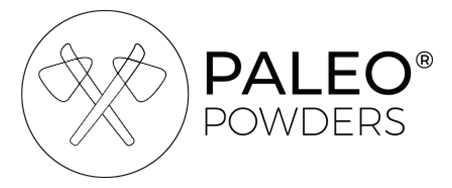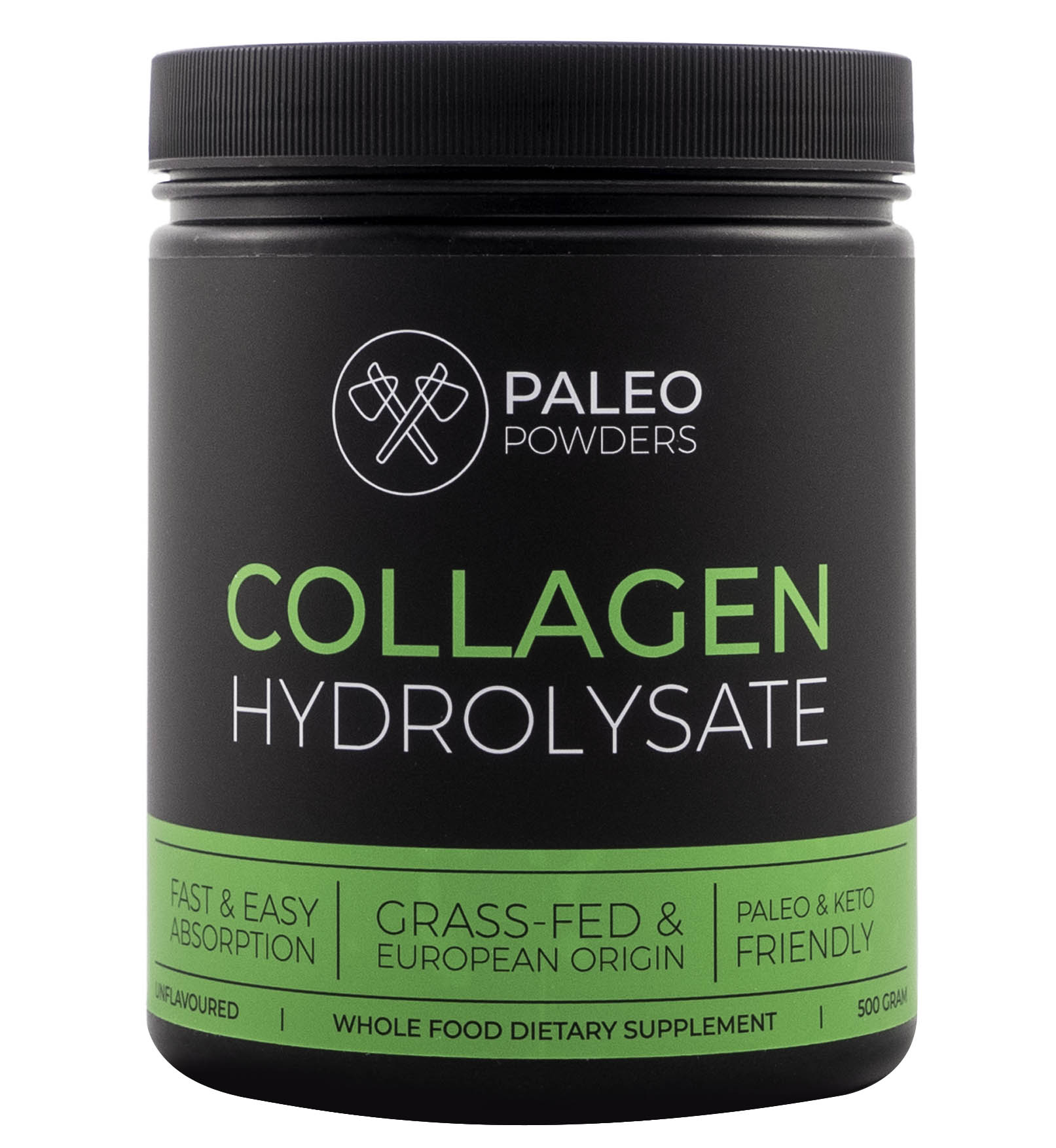
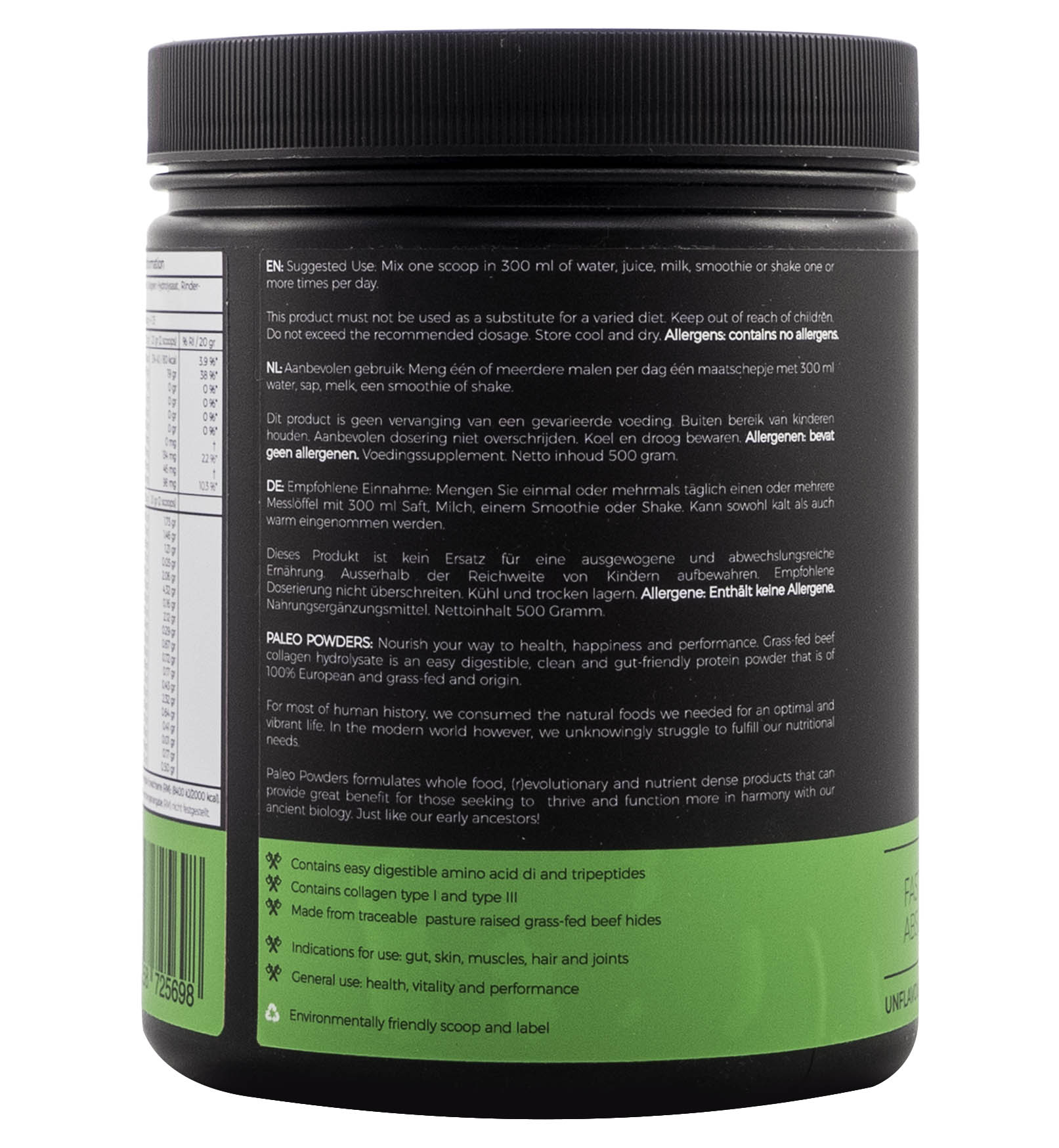
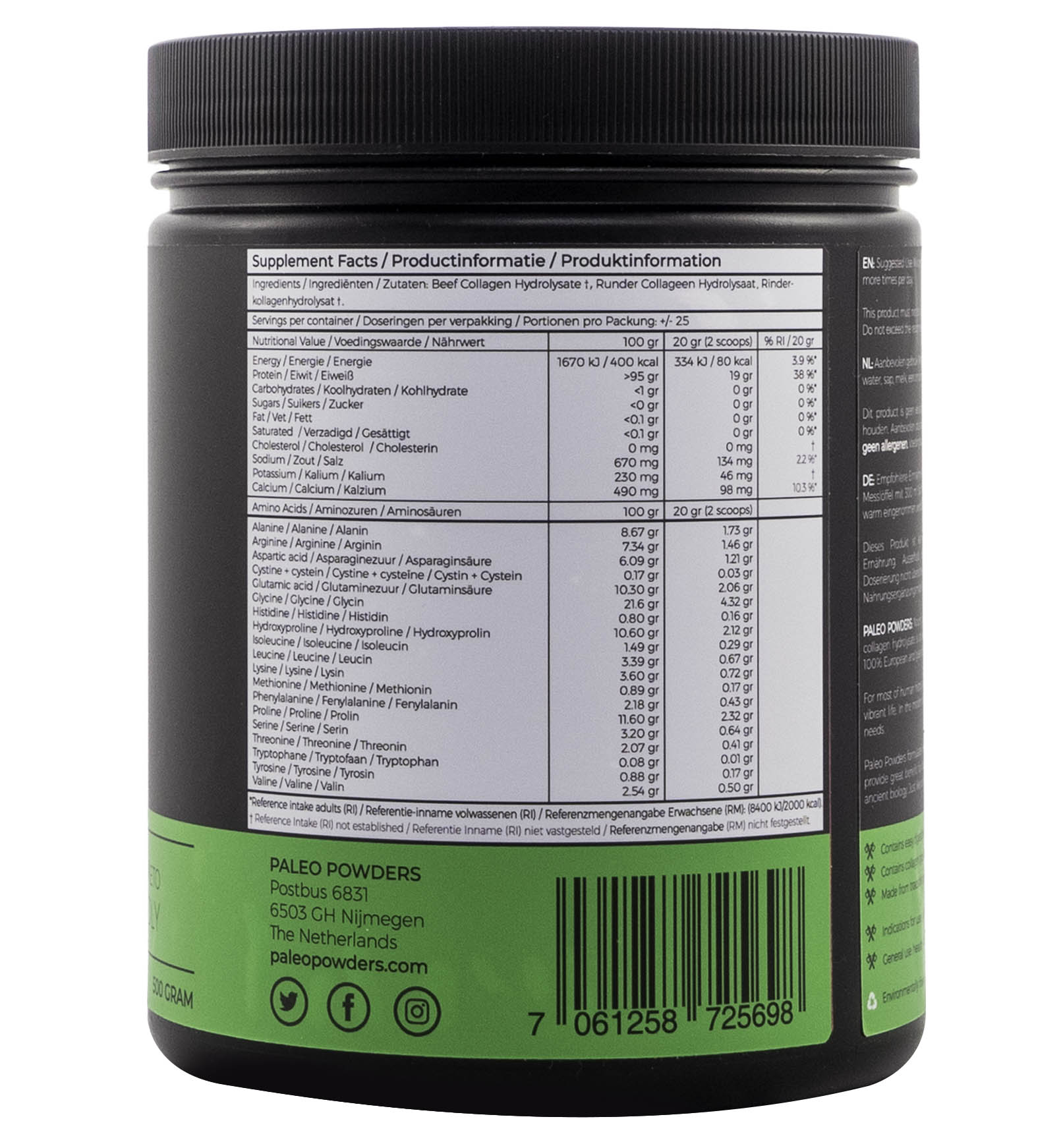
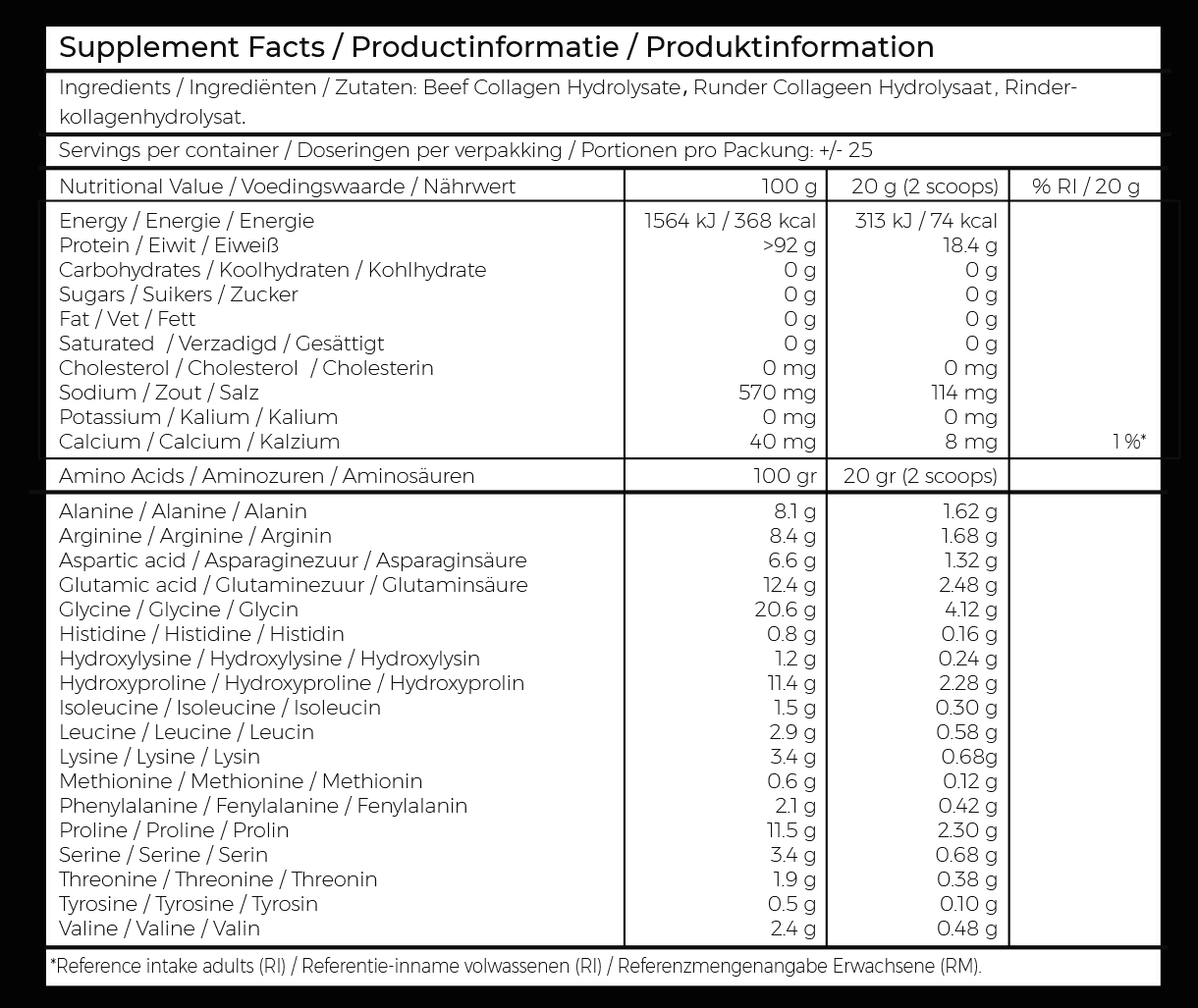

Collagen Hydrolysate - Grass-Fed - 500 grams
Tax included.
Collagen Hydrolysate is the ultimate nutricosmetic supplement! Over 70% of the proteins in your skin are made up of collagen. But collagen isn't limited to the skin—it's found almost everywhere in your body. Collagen Hydrolysate acts as the "cellular glue" that holds all your connective tissues together.
The versatile role of Collagen Hydrolysate
Collagen is therefore not only decisive for your appearance, but also for how you feel and how well your body functions. By taking collagen through food or supplements, you replenish your own supply.
Maintaining healthy collagen levels and an adequate daily intake fits in with the dietary pattern that our bodies are evolutionarily set up for.
Benefits of Collagen Hydrolysate:
- Neutral taste and easily soluble
- Rich in amino acids such as glycine, proline and hydroxyproline
- Perfect for a keto diet: contains 0 grams of sugar
- Contains collagen type I and III
- More than 95% protein per serving
- Made in Europe, guaranteed quality
- Comes from grass-fed European pasture cattle
- Each jar contains 500 grams
Why do you need collagen?
- Just like muscles, bones and even your brain, collagen in your body also needs nutrients and stimuli to function properly.
- From the age of 40, collagen production decreases by about 25%. By age 60, this decrease is even more than half what it was at a younger age. Time is definitely not on your side. By supplementing with collagen, you support your own collagen network.
- Collagen helps bring balance to the modern diet. These days, we primarily eat lean muscle meat, which is rich in l-methionine and low in glycine. Collagen, on the other hand, has the opposite profile: low in l-methionine and high in glycine.
Upgrade yourself from within with Collagen Hydrolysate
You can increase your collagen intake in several ways, such as by eating bone broth, stews, or meat cuts rich in connective tissue. A practical alternative is a high-quality collagen hydrolysate powder from grass-fed, pasture-raised cattle. This is an easy way to supplement your diet with essential amino acids. By taking collagen, you support your natural collagen network.
Glycine, lysine & (hydroxy)proline
Collagen doesn't contain all the essential amino acids and is therefore an incomplete protein. However, the amino acids it does contain are exceptionally valuable—especially glycine. Glutamine, lysine, and (hydroxy)proline also play a significant role. The amino acid profile of collagen differs significantly from that of lean meat, and together they complement each other perfectly. Probably exactly as nature intended! Muscle meat is high in l-methionine and low in glycine, while collagen is rich in glycine. A good balance between these amino acids appears crucial for health and longevity.
Paleo and keto approved
Collagen Hydrolysate is made from Paleo-approved raw materials and is ideal for a ketogenic diet, as it contains 0 grams of sugar. With the high-quality nutritional value of European grass-fed cattle, the powder is not only nutritious but also practical. Supporting your collagen networks has never been easier in a Paleo-friendly way. Collagen Hydrolysate is also easily digestible and quickly absorbed.
100% European origin
Our collagen peptides are sourced from grass-fed European pasture-raised cattle. During the winter, the cows continue to receive natural feed in the form of silage (fermented grass) or hay. Supplementary feed is used only when absolutely necessary for animal health. By sourcing from Europe, we increase sustainability and transparency. Paleo Powders Collagen is therefore a conscious choice in terms of quality, the environment, and animal welfare – unlike collagen from intensive factory farming or from the Americas and Asia.
Made from nutritious bones
Our collagen is produced from high-quality cowhide, which is naturally and gently hydrolyzed with enzymes. The result: peptides with a low molecular weight of 3–6 kDa, highly soluble, and tasteless. This makes them ideal for shakes, smoothies, and recipes. Thanks to their low molecular weight, they are absorbed quickly and effectively. With over 95% protein per serving, our collagen is as pure and high-quality as possible.
Quality is important
Not all collagen powders are created equal. In 2020, the Clean Label Project tested 30 collagen products for heavy metals such as arsenic, cadmium, lead, and mercury. The results showed that all products were within safe limits for mercury, but 34% contained measurable traces, 37% high levels of lead, and 17% high levels of cadmium.
By choosing animal-friendly and sustainable European sources, much of this risk is avoided. The report emphasizes that contamination often stems from concentrated animal feed and intensive production. Air pollution also plays a role, but this can be largely prevented with proper processing methods.
Tested for heavy metals
Quality control, safety, and transparency are essential to us. Every batch of collagen is double-tested in an independent laboratory. This is how we guarantee quality. Typical heavy metal levels in our Collagen Hydrolysate are:
- Arsenic (As) < 0.10 mg/kg = < 0.1 PPM
- Cadmium (Cd) < 0.01 mg/kg = < 0.01 PPM
- Lead (Pb) < 0.05 mg/kg = < 0.05 PPM
- Mercury (Hg) < 0.005 mg/kg = < 0.005 PPM
Difference between Collagen, Bone Broth & Kefir
| Collagen Hydrolyzate | Bone Broth | Kefir Whey |
| Neutral taste | Mildly savory | Creamy |
| Fast recording | Normal recording | Fast recording |
| Hydrolyzed | Not hydrolyzed | Semi-hydrolyzed |
| Collagen type I & III | Type I to V | No collagen |
| Enzymatic | Slowly pulled | Fermented |
| 95% proteins | 98% proteins | 90% proteins |
| 95% collagen | 78–84% collagen | 0% collagen |
| No dairy | No dairy | Dairy (whey) |
| 0% fat | 2–5% fat | 0% fat |
| 0% sugars | 0% sugars | 0% sugars |
| Glycine 21.6% | Glycine 20% | Glycine 1.5% |
| BCAAs 7.42% | BCAAs 8.4% | BCAAs 23.75% |
| Hydroxyproline 10.6% | Hydroxyproline 10.2% | Hydroxyproline 0% |
| From skin | From fleshy bones | From milk |
| No glucosamine | Contains glucosamine | No glucosamine |
| No chondroitin | Contains chondroitin | No chondroitin |
| No hyaluronic acid | Contains hyaluronic acid | No hyaluronic acid |
Primal background
Our ancestors ate much more collagen than we do now. They consumed the entire animal—from skin and tendons to gelatinous parts. "Nose-to-tail eating" was common, for both land and sea animals. Nowadays, we eat mostly lean muscle meat and therefore much less collagen.
Migration: more animal food
As hunter-gatherers moved from the equator to colder regions, the availability of plants decreased. This was compensated for by animal foods. While early societies derived about 50% of their diet from animal sources, modern hunter-gatherers derive around 60%.
Nose-to-tail concept
Eating only lean muscle meat without the fats, organs, and collagen-rich tissues wouldn't have been enough to survive in prehistoric times. Today, we prefer tender meat and forgo the tougher, collagen-rich cuts. The difference from earlier consumption is therefore significant. Vegetarians and vegans consume even less collagen, making supplementation particularly valuable.
Fascinating collagen dynamics
Collagen responds to mechanical stress on the body, such as during exercise and sports. The structure of the cartilage in your knees, for example, changes with every step. Just like with muscles and bones, the saying "use it or lose it" applies here. Sufficient and varied exercise helps keep collagen tissue strong and functional.
Synergy between collagen & water
After water, collagen is the most abundant substance in your body. Collagen is approximately 60% water. Water molecules bind tightly to collagen's helical structure, helping to determine its function and quality. Therefore, hydration, healthy mitochondria, and plenty of pure water are essential for collagen health.
Hierarchy of health factors
Besides nutrition and exercise, sleep, sunlight, and contact with the earth are also important factors for healthy collagen levels. Sleep provides recovery, sunlight (especially around sunrise and sunset) provides red and infrared light, and "earthing" supplies the connective tissue matrix with electrons from the earth.
The most common protein
Collagen is the most abundant protein in the animal kingdom. There are at least 16 types, of which types I, II, and III make up 80–90%. In cells, actin is the most abundant protein and crucial for numerous functions. In plants, this is RuBisCO, an enzyme responsible for photosynthesis and found in enormous quantities worldwide.
Summary Collagen Hydrolysate
Collagen Hydrolysate isn't just a supplement for your appearance, but also for your overall health. It's an essential building block of skin, bones, joints, and connective tissue. Moreover, bovine collagen is an excellent alternative to fish collagen, especially for people with allergies. Thanks to its high protein content, unique amino acids, and easily digestible structure, collagen is a valuable supplement for virtually everyone.
Content
Instructions
INGREDIENTS
Choose options





